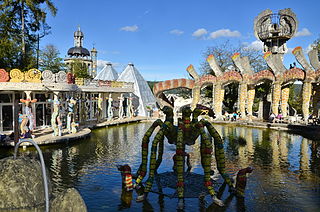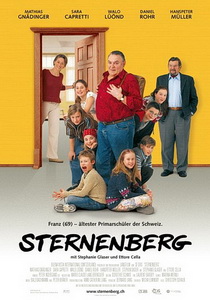
The Swiss Broadcasting Corporation is the Swiss public broadcasting association, founded in 1931, the holding company of 26 radio and television channels. Headquartered in Bern, the Swiss Broadcasting Corporation is a non-profit organisation, funded mainly through radio and television licence fees (70%) and making the remaining income from advertising and sponsorship.
SRF zwei is a Swiss German-language free-to-air television channel run under the public SRG SSR broadcasting group.

SRF 1 is a German-language Swiss television channel, one of three produced by the SRG SSR public-service broadcasting group. The channel, formerly known as SF1, was renamed on 16 December 2012, together with its sister German-speaking TV channels and five radio channels, as part of an exercise aimed at emphasizing their common ownership as well as establishing a shared web presence for all of them.
Swiss Standard German, or Swiss High German, referred to by the Swiss as Schriftdeutsch, or Hochdeutsch, is the written form of one of four official languages in Switzerland, besides French, Italian and Romansh. It is a variety of Standard German, used in the German-speaking part of Switzerland and Liechtenstein. It is mainly written, and rather less often spoken.

SRF Tagesschau, simply titled Tagesschau until 4 December 2005, is the title of a current-affairs show on German-speaking Swiss public channel SRF 1. The main edition is broadcast at 7:30 pm and further editions are shown around noon and at the end of daily broadcasting. In 1990, another news show called 10vor10 was added, as well as Schweiz aktuell for regional information.

SRF info is a German-language Swiss television channel owned by Schweizer Radio und Fernsehen. The channel started trial broadcasts in May 1999 and regular broadcasts in January 2001.
Television in Switzerland was introduced in 1950, with regular broadcasts commencing in 1953. People who live in Switzerland are required by law to pay a television licence fee, which is used to finance the public radio and television service SRG SSR. Since 1 January 2021, the Licence fee cost in all the linguistic regions of Switzerland is 355 CHF per year or 83.75 CHF quarterly, counting both radio and television licences. All licence fee payers are entitled under the law to services of equal quality. The fee is charged per household and not per person, with empty dwellings being exempt. The fee is determined by the Federal Council.
The Swiss Film Award is the national film award of Switzerland, first given out in 1998.
Switzerland participated in the Eurovision Song Contest 2014 with the song "Hunter of Stars" written and performed by Sebalter, which is the artistic name of singer Sebastiano Paù-Lessi. The Swiss entry for the 2014 contest in Copenhagen, Denmark was selected through the national final Die grosse Entscheidungs Show 2014, organised by the Swiss German speaking broadcaster Schweizer Radio und Fernsehen (SRF) in collaboration with the other broadcasters part of the Swiss Broadcasting Corporation. Artists that were interested in entering the Swiss national final had the opportunity to apply to one of three open selections with defined submission periods organised by SRF together with the Swiss-Romansh broadcaster Radiotelevisiun Svizra Rumantscha (RTR), the Swiss-French broadcaster Radio Télévision Suisse (RTS) and/or the Swiss-Italian broadcaster Radiotelevisione svizzera (RSI). A total of 18 entries were selected to advance to an "Expert Check" round; nine entries were selected from the SRF/RTR selection, six entries were selected from the RTS selection and three entries were selected from the RSI selection. The "Expert Check" was held on 30 November 2013 and involved three/four experts evaluating the live performances of the 18 entries and selecting six entries to advance to the televised national final—three artists and songs from the SRF/RTR candidates, two from the RTS candidates and one from the RSI candidates. The six finalists performed during the national final on 1 February 2014 where a combination of jury voting and public voting ultimately selected "Hunter of Stars" performed by Sebalter as the winner.
Switzerland participated in the Eurovision Song Contest 2015 with the song "Time to Shine" written and performed by Mélanie René. The Swiss entry for the 2015 contest in Vienna, Austria was selected through the national final ESC 2015 – die Entscheidungsshow, organised by the Swiss German speaking broadcaster Schweizer Radio und Fernsehen (SRF) in collaboration with the other broadcasters part of the Swiss Broadcasting Corporation. Artists that were interested in entering the Swiss national final had the opportunity to apply to one of three open selections with defined submission periods organised by SRF together with the Swiss-Romansh broadcaster Radiotelevisiun Svizra Rumantscha (RTR), the Swiss-French broadcaster Radio Télévision Suisse (RTS) and/or the Swiss-Italian broadcaster Radiotelevisione svizzera (RSI). A total of 18 entries were selected to advance to an "Expert Check" round; nine entries were selected from the SRF/RTR selection, six entries were selected from the RTS selection and three entries were selected from the RSI selection. The "Expert Check" was held on 7 December 2014 at SRF Studio 5 in Zürich and involved five experts evaluating the live performances of the 18 entries and selecting six entries to advance to the televised national final—three artists and songs from the SRF/RTR candidates, two from the RTS candidates and one from the RSI candidates. The six finalists performed during the national final on 31 January 2015 where a combination of jury voting and public voting ultimately selected "Time to Shine" performed by Mélanie René as the winner.

Bruno Weber Park is a sculpture park in the Swiss municipalities Spreitenbach and Dietikon, and besides the Fahr Abbey one of the visitor attractions in the Limmat Valley. The sculpture garden is designed as a Gesamtkunstwerk of the Swiss artist Bruno Weber (1931–2011).

10vor10 is a current affairs programme broadcast at 21.50 every Monday to Friday evening on the German-language Swiss public television channel SRF 1.
Rotpunktverlag is a Swiss publishing house, headquartered at Hohlstrasse 86A, 8004 Zürich, Switzerland. Founded in 1976 in Zürich, it is specialized in political history.
The Swiss children coercion reparation initiative was a Swiss federal popular initiative to change the federal constitution, which was launched in April 2014.

Sternenberg is a 2004 Swiss German language film. It was filmed and produced at locations in the canton of Zürich in Switzerland, and stars Mathias Gnädinger, Walo Lüönd and Stephanie Glaser.
Einstein is the title of an infotainment show on the German-speaking Swiss public television channel SRF 1. Einstein is an in-house production by Schweizer Radio und Fernsehen (SRF) and reports on phenomena and mysteries of everyday life and of life.

Charles Lewinsky is a Swiss screenwriter and playwright, as well as a writer of novels and non-fiction, born and living in Zürich.

Wauwilermoos was an internment camp and prisoner-of-war penal camp in Switzerland during World War II. It was situated in the municipalities of Wauwil and Egolzwil in the Canton of Lucerne (Luzern). Established in 1940, Wauwilermoos was a penal camp for internees, including Allied soldiers, among them members of the United States Army Air Forces, who were sentenced for attempting to escape from other Swiss camps for interned soldiers, or other offences. Together with Hünenberg and Les Diablerets, Wauwilermoos was one of three Swiss penal camps for internees that were established in Switzerland during World War II. The intolerable conditions were later described by numerous former inmates and by various contemporary reports and studies.

DOK is the title of a show on German-speaking Swiss public channel SRF 1.
Switzerland participated in the Eurovision Song Contest 2016 with the song "The Last of Our Kind" written by Christina Maria Rieder, Mike James, Jeff Dawson and Warne Livesey. The song was performed by Rykka, which is the artistic name of singer Christina Maria Rieder. The Swiss entry for the 2016 contest in Stockholm, Sweden was selected through the national final ESC 2016 – die Entscheidungsshow, organised by the Swiss German speaking broadcaster Schweizer Radio und Fernsehen (SRF) in collaboration with the other broadcasters part of the Swiss Broadcasting Corporation. Artists that were interested in entering the Swiss national final had the opportunity to apply to one of three open selections with defined submission periods organised by SRF together with the Swiss-Romansh broadcaster Radiotelevisiun Svizra Rumantscha (RTR), the Swiss-French broadcaster Radio Télévision Suisse (RTS) and/or the Swiss-Italian broadcaster Radiotelevisione svizzera (RSI). A total of 19 entries were selected to advance to an "Expert Check" round; ten entries were selected from the SRF/RTR selection, six entries were selected from the RTS selection and three entries were selected from the RSI selection. The "Expert Check" was held on 6 December 2015 and involved four experts evaluating the live performances of the 19 entries and selecting six entries to advance to the televised national final—three artists and songs from the SRF/RTR candidates, two from the RTS candidates and one from the RSI candidates. The six finalists performed during the national final on 13 February 2016 where a combination of jury voting and public voting ultimately selected "The Last of Our Kind" performed by Rykka as the winner.










